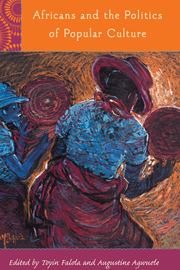Book contents
- Frontmatter
- Contents
- List of Illustrations
- Preface
- Introduction
- 1 From Primitive to Popular Culture: Why Kant Never Made It to Africa
- Part One Politics of Culture in Habitual Customs and Practices
- Part Two Politics of Culture in Popular Representations: Films and Performances
- Part Three Politics of Culture in Popular Texts
- 12 Literary Cultural Nationalists as Ambassadors across the Diaspora
- 13 Popular Resistance Literature and the Nigerian Railway Corporation, 1955–60
- List of Contributors
- Index
- Rochester Studies in African History and the Diaspora
12 - Literary Cultural Nationalists as Ambassadors across the Diaspora
from Part Three - Politics of Culture in Popular Texts
Published online by Cambridge University Press: 12 September 2012
- Frontmatter
- Contents
- List of Illustrations
- Preface
- Introduction
- 1 From Primitive to Popular Culture: Why Kant Never Made It to Africa
- Part One Politics of Culture in Habitual Customs and Practices
- Part Two Politics of Culture in Popular Representations: Films and Performances
- Part Three Politics of Culture in Popular Texts
- 12 Literary Cultural Nationalists as Ambassadors across the Diaspora
- 13 Popular Resistance Literature and the Nigerian Railway Corporation, 1955–60
- List of Contributors
- Index
- Rochester Studies in African History and the Diaspora
Summary
Introduction
In 1915, African American philosopher Alain Locke argued that race was a cultural (versus a biological) construct. He maintained that for black Americans to liberate themselves and integrate themselves as equals into the dominant white American culture, they needed to produce artists who looked to historical African American experiences not only as the source of their works but also as a source for a positive cultural identity. This ideology provided the theoretical foundation upon which the Harlem Renaissance was established in the years following World War I.
During the 1920s, 1930s, and 1940s, there were seven similar movements among people of color who experienced racialized forms of colonial oppression in the Atlantic basin: (1) Négritude, the French literary movement identified with the Martinican poets Aimé Césaire and Paulette Nardal, the Guyanese poet Léon-Gontran Damas, and the Senegalese poet Léopold Sédar Senghor; (2) Claridade, the literary movement associated with the review of art and letters of the same name published in the Cape Verde Islands; the principal authors, or Claridosos, included Jorge Barbosa, Baltasar Lopes da Silva, and Manuel Lopes; (3) Afro-Cubanismo, a movement including Cuban writers of African descent such as Nicolás Guillén and Lydia Cabrera; (4) the Engagé writers of Haiti, such as Jacques Roumain and Jean Price-Mars, associated with the periodical La Revue Indigène; (5) Modernismo Afro-Brasileiro, including writers such as Lino Guedes, Carolina Maria de Jesus, and Solano Trinidade; (6) the New African Movement among black South African writers including Sol Plaatje, Herbert Dhlomo, B. W. Vilakazi, and A. C. Jordan; and (7) the Creole Proto-Nationalist Movement in Belize including poets Samuel A. Haynes and James S. Martinez.
- Type
- Chapter
- Information
- Africans and the Politics of Popular Culture , pp. 277 - 298Publisher: Boydell & BrewerPrint publication year: 2009



